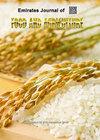青茎综合征对大豆品质参数的影响及早期检测的可行性研究
IF 0.7
4区 农林科学
Q3 AGRONOMY
引用次数: 0
摘要
绿茎综合征是世界大豆生产中遇到的主要问题之一,因为它使联合收割机的收获变得困难。虽然土耳其绿茎综合征的患病率尚不清楚,但近年来已开始频繁观察到。本研究根据品种测定了部分大豆品种生长阶段的叶色特征。采用L *、a *、b *色阶对V3 ~ R8期叶片的颜色变化进行监测。研究了在R8期前检测叶片颜色变化的可能性。对R8期有症状和无症状植物的种子样品进行了一些质量参数评价。结果表明,与健康植株相比,该综合征植株的种子发芽率平均下降61.4%。此外,与无症状种子相比,有症状种子体积较大,脂肪比较低,棕榈酸和亚油酸值较低,油酸值较高。在本研究中,最显著的差异表现在发芽和收获期间的茎水分值。另外,检测青茎综合征可用b*色值作为标记。本研究的假设是,通过观察大豆叶片的颜色值,可以在早期诊断出该综合征。在未来的研究中,叶子的颜色也可以作为机器学习模型的一个参数。 关键词:收获期,甘氨酸max (L.),绿茎综合征,叶色,机器学习本文章由计算机程序翻译,如有差异,请以英文原文为准。
A study of the effects of green stem syndrome on some quality parameters in soybean and the possibility of early detection
Green stem syndrome is one of the major problems encountered in soybean production in the world because it makes harvesting with a combine harvester difficult. Although the prevalence of the green stem syndrome Turkey is unknown, in recent years it has started to be observed frequently. Leaf color characters in the growing stages of some soybean varieties have been determined according to varieties in this study. Color changes in the leaves from V3 to R8 phase were monitored using L *, a *, b * color scale. Possibility of detecting changes in leaf color before the R8 stage was studied. Some quality parameters have been evaluated in seed samples obtained from plants with and without symptoms in the R8 stage. It was determined that the germination rate of the seeds obtained from the plants with the syndrome decreased by 61.4% on average compared to those from healthy plants. Furthermore, compared to non-symptomatic seeds, symptomatic seeds were larger, had a lower fat ratio, lower palmitic and linoleic fatty acid values, and higher oleic fatty acid values. At this study was determined that the most significant difference was manifested in terms of stem moisture values during germination and harvesting. In addition, detection of green stem syndrome can be used b* color value as a marker. The hypothesis of the study is that the syndrome can be diagnosed at early stage by following color values in the soybean leaves. In the future studies the color of the leaf can also be a parameter available for the machine learning models.
Keywords: Harvest stage, Glycine max (L.), green stem syndrome, leaf color, machine learning
求助全文
通过发布文献求助,成功后即可免费获取论文全文。
去求助
来源期刊

Emirates Journal of Food and Agriculture
AGRONOMYFOOD SCIENCE & TECHNOLOGY&nb-FOOD SCIENCE & TECHNOLOGY
CiteScore
1.80
自引率
0.00%
发文量
18
期刊介绍:
The "Emirates Journal of Food and Agriculture [EJFA]" is a unique, peer-reviewed Journal of Food and Agriculture publishing basic and applied research articles in the field of agricultural and food sciences by the College of Food and Agriculture, United Arab Emirates University, United Arab Emirates.
 求助内容:
求助内容: 应助结果提醒方式:
应助结果提醒方式:


